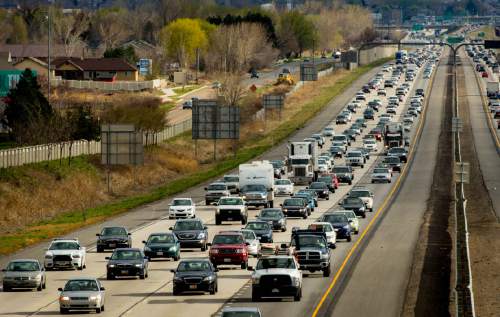This is an archived article that was published on sltrib.com in 2014, and information in the article may be outdated. It is provided only for personal research purposes and may not be reprinted.
Vernal • To better fund transportation, legislators are seriously considering big hikes in sales taxes, fuel taxes, vehicle registration fees and perhaps more.
The Legislature's Interim Transportation Committee held a special meeting in Vernal on Tuesday to sort through possibilities of how to cover an estimated $11 billion shortfall for priority projects in the state's unified transportation plan through 2040. It has been studying the matter for a year.
"In my opinion, we're going to be looking at least at three things" for needed funding, said Sen. Kevin Van Tassell, R-Vernal, co-chairman of the committee. They include gasoline tax hikes, sales tax hikes and increases in vehicle registration fees.
The committee has developed an elaborate computer program that can project how much money would come from different mixtures of increases in each of those taxes, and experimented a bit with different levels Tuesday without forming final proposals.
Van Tassell said the state will almost surely need to increase its current taxes on gasoline and diesel of 24.5 cents per gallon, which has not been increased since 1997.
"There are very few things we can do that will give us the bang for the buck that the gasoline tax would," he said.
Some committee members suggested an increase of 5 cents a gallon. The committee figured that would generate about $74 million a year. But the committee also looked at how much would come from increases of 7 or 10 cents a gallon.
Rep. Don Ipson, R-St. George, who is president of a trucking company, said the trucking industry figures it could live with an increase of 5 cents, but 10 cents would be too much — and could backfire on the state by making truckers avoid it.
Diesel tax on interstate trucking is divided according to miles traveled in each state, not where the fuel is purchased. But Ipson warned if Utah raises fuel taxes too high, truckers would avoid the state — and Utah will lose revenue and hurt industries focused on serving trucks.
The committee is also looking at allowing the gasoline tax to rise automatically with inflation every year. That could bring in between $2.2 billion and $3.7 billion cumulatively through 2040, depending on whether the tax is tied to the Consumer Price Index or a higher construction price index, the committee figured.
"The gasoline tax has lost about 40 percent of its purchasing power since the last increase" in 1997, said Lincoln Shurtz, government affairs director for the Utah Association of Counties. "Meanwhile, there has been a 300 percent increase in the cost of building roads."
Cities and counties receive 30 percent of the state fuel tax for local roads. But they say it currently covers only about 55 percent of their road costs, and they have been using an increasingly greater percentage of their general funds for roads.
So cities and counties asked the committee Tuesday to allow them to impose an additional quarter-cent sales tax — on all purchases, not just fuel — to come up with the $3 billion extra they figure they need for local projects through 2040.
That extra quarter-cent per $1 in sales would generate an estimated $123 million a year statewide. The Legislature would need to raise current caps on sales tax, then counties or cities would need to hold elections for voters to approve the hike.
Rep. Johnny Anderson, R-Taylorsville, committee co-chairman, asked if cities and towns believe they could convince voters that such a tax hike for transportation is warranted, even if it is paid by everyone instead of just highway users.
Cameron Diehl, government affairs director for the Utah League of Cities and Towns, said local governments would argue that everyone uses roads, and benefits from products moved on them. He said road disrepair is so dire in most cities that voters would support the tax hike.
The committee is also looking at raising car registration fees — especially on electric, hybrid, natural gas or high-mileage cars that escape gasoline tax or pay less because of better fuel mileage.
Anderson noted they still use the highways, so a higher registration fee for them would help ensure they pay their fair share.
The committee did not propose specific fee hikes, but looked at revenue that would be generated for higher fees of up to $70 for some such cars.
Even in looking at all those potential tax hikes, the committee has been asked to pass even more — including allowing raising sales taxes for mass transit up to 1 cent per $1, a 45 percent jump or more in Wasatch Front counties..
Anderson said the committee will continue to look at what it will propose when the Legislature convenes next month. "Let's solve some problems this year," he told members.
"My personal belief is doing nothing is not an option," Van Tassell said. "If we do nothing, we lose everything we have gained" in recent years to address congestion.



